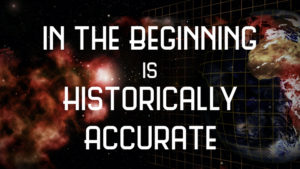
Currently, I am writing some bible class lessons that I hope to use at NHCOC that deal with Christian apologetics (This is the study of defending Christianity as truth and comparing it with evolution). This morning I have been working on a lesson that compares Creation and Evolution. In this lesson, I am presenting some creation questions that I believe help us see the truth about creation. I want to share with you one of those questions and provide an answer that I think is interesting and might help you get your mind off of COVID-19 for a moment or two.
Is what we read in Genesis 1-11 historically accurate?
When my family was in the Smithsonian museum last summer, and we were exposed to the “old earth” theory that teaches that the earth is billions of years old. Even yesterday, when my kids were watching their AMI lessons on Arkansas PBS they were exposed to this false teaching. Walt looked over at Kira and me and said, “Welp, that’s not true”! People including our children often struggle with what they read in the first few chapters of Genesis because what they have been told is that the earth is billions of years old in every other science lesson and museum. Let’s make sure to un-teach our children after those PBS lessons and teach them the truth.
For some, this contradiction between creation and evolution is hard to reconcile when they read Genesis 1-11. Some people might be intimidated by the contradiction and begin to think they are reading the Bible wrong. The reason is that all these well-educated scientists are telling them that the earth is billions of years old, and they begin to think that what they read in Genesis 1-11 is just poetry and not historically accurate. Which is it?
Genesis is not a book that was written in a poetic style. Genesis is written in the style of historical narrative. While the Bible does contain poetic sections like the books of Psalms, Proverbs, and Song of Solomon. These books contain language that is called “synonymous antithetical parallelism.” This is means some phrases have similar language that communicates the same message but with different words.
A great example is in Psalm 19:1, “The heavens declare the glory of God, and the sky above proclaims His handiwork.” These two phrases go together. The word “heavens” is synonymous with the word “sky” and the word “declare” is synonymous with “proclaims”. One could even argue that the phrase “glory of God” is synonymous with “His handiwork”. This style is what characterizes Hebrew poetry. These writers were not concerned with rhyme or meter as we are in English poetry. Hebrew poetry is concerned with parallelism, and it is not found in Genesis 1-11.
Instead, what you find is a plethora of details that are not characteristic of poetry. In fact, in Genesis 5, you see a long list of names of who begot who and who begot who (The genealogies one might read to help you go to sleep). The fact is, those verses are there for a reason. It communicates to us that these events are real history and are of great value because of the accuracy of who begot who. These people had names and had children and grandchildren and great-grandchildren. We find this same attention to detail in the genealogy of Jesus.
It is also important to realize that Jesus understood the historical accuracy of the creation story, as found in Genesis 1-11. In Matthew 19:4-6 Jesus says, “Have you not read that He who created them from the beginning made them male and female, and said, ‘For this reason A man shall leave his father and mother and be joined to his wife, and the two shall become one flesh’? So they are no longer two, but one flesh. What therefore God has joined together, let no man separate”. Jesus quotes Genesis 1:27 and Genesis 2:24 with no apology at all. If Jesus quotes these passages, then He must have believed it to be accurate, true, authoritative, and historical. If Jesus believed it to be this way, then so should we.
Studying apologetics is very interesting to me, and I hope to include more of it in more of my lessons, sermons, and maybe even have a quarter of Bible classes dedicated to what I am learning now. I think you would enjoy it and love it as much as I do.
I love you,
~ Alexander

